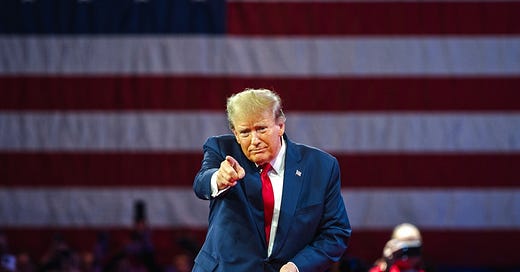
The UK should relish the coming trade war
The UK is well placed to benefit from Trump’s drive to rewire global trade
I don’t know if anyone reads the National Bureau of Economic Research, but they really should – especially right now. Buried beneath the trade figures, an academic paper from 2022 explains why the coming trade war between the US and its economic partners is a hidden blessing.
Pablo D. Fajgelbaum of the University of California and his co-researchers asked what effect the first US-China trade war had on the world economy. One of their answers was fairly predictable: bilateral trade between the two decreased, but other countries benefitted as importers sought substitutes for tariffed goods. Many US buyers of Chinese washing machines, for example, turned to substitutes from Vietnam once US tariffs were applied to them.
The researchers’ second conclusion was weirder. “The trade war created net trade opportunities rather than simply shifting trade across destinations.” Rather than stifling globalisation, the trade war accelerated it, by as much as 3% in the period studied.
This led to a third conclusion. Students, pay attention. There was a wide divergence in which countries benefitted from the trade war. On the losers’ list were, among others, Japan, South Africa, and Indonesia. On balance, these countries failed to capitalise on new trade opportunities created by the rewiring of global trade.
But two countries stood out as clear winners. The first was Taiwan, likely because of its critical role in the global semiconductor industry upon which the global economy is reliant. The second was the UK. Both countries were unique in benefitting from the redirection of trade from both China and the US.
That the UK was one of only two trading nations to come out on top of the last trade war is good news. It also flies in the face of the current political rhetoric coming from both the US and from Europe this week. Trump has announced he will apply a 25% tariff on all goods from its two regional partners, Canada and Mexico, as well as from China. A precedent has been set: “America First” will take no prisoners.
But the retaliatory claim of the ECB’s vice-president that tariffs are bad because they create a “vicious circle” which harms global trade is not only categorically wrong, as per the NEBR’s findings. It presupposes that other nations have no choice about how they choose to respond to tariffs. They do, of course, and the prime minister is right to insist that the UK will not retaliate to potential tariffs from the US. Instead, the UK should focus on ensuring it is well placed to capture the new trade opportunities that will arise as a result.
It is worth remembering that the maintenance of an “inclusive, equitable” and “non-discriminatory” trade order was among the top issues for the recent BRICS forum in Kazan, attended by countries representing over a third of global purchasing power. It was also a priority at the recent APEC and G20 summits in Latin America, attended by dozens of emerging market countries.
The UK is making inroads in all of them: via APEC’s free trade area, the Comprehensive and Progressive Trans-Pacific Partnership (CPTPP), of which the UK is a part-member; and via the Association of South-East Asian Nations (ASEAN) and the Gulf Cooperation Council (GCC).
Admittedly, many of these emerging market countries are export-driven. They have an obvious interest in maintaining free trade with the G7. UK trade policy therefore remains a balancing act. It cannot rebuke protectionism abroad only to foment demand for protectionism at home.
Nor can the UK bribe major economies with promises of massive investment in domestic infrastructure to ensure free reign for its own exports. This has been China’s practice for a long time, and explains much of Xi Jinping’s progress in closing the trade gap in regions such as Latin America – once considered America’s playground.
What the UK can do, though, is recognise its strengths as a free trade nation. Fajgelbaum et. al. observe that the countries best positioned to benefit from a trade war are those with “a high degree of international integration.” If the UK can resist calls for retaliation, it can make the most of this paradox.
Doing so will mean the UK occasionally has to take hits. It will not get a fair deal at all times. But recent history suggests the UK stands to benefit from the trade war ahead.
Oliver Rhodes is a geopolitical consultant at the Brunswick Group.














This article makes some bold claims but falls short on several fronts. It leans too heavily on a single 2022 study, ignoring the need for more recent or corroborating research. The supposed UK trade “success” during the US-China trade war is glossed over—what industries or policies drove this outcome? Without specifics, the argument feels hollow. The suggestion to avoid retaliation is naïve without clear strategies for protecting UK industries or seizing opportunities. It also dismisses valid concerns about the long-term damage of tariffs without offering a convincing rebuttal. The non-retaliation strategy sounds nice in theory but doesn’t explain how the UK stays competitive while others play hardball. By ignoring domestic political pressures for protectionism, the article comes off as overly idealistic. It also barely scratches the surface of how emerging markets or agreements like CPTPP factor into the picture. Worst of all, it’s overly optimistic, ignoring vulnerabilities like Brexit fallout, and lacks historical context, leaving it out of touch with reality. It’s big on rhetoric but light on substance. Not exactly the kind of depth you'd expect from someone calling themselves a 'geopolitical consultant.'